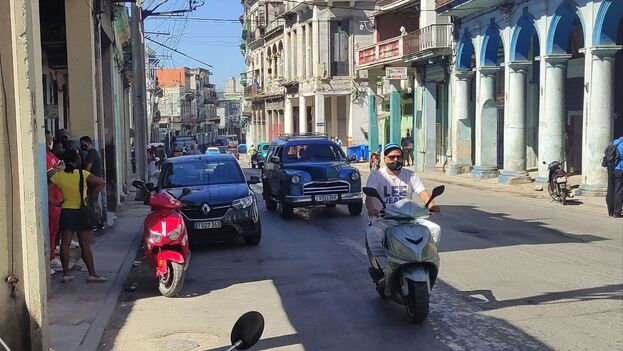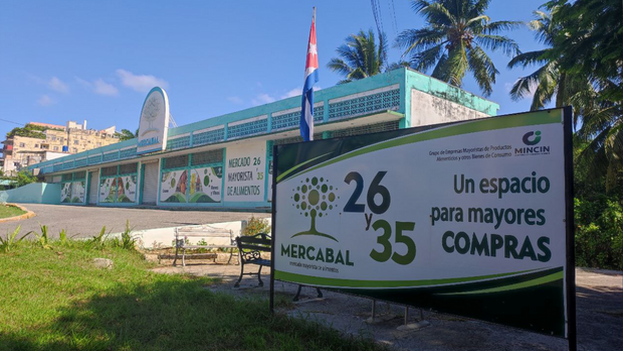
![]() 14ymedio, Yoani Sánchez, Generation Y, Havana, 24 September 2022 — As I adjust my helmet, he tells me that he is 29 years old and has an ulcer. I get on the back of the motorcycle and we head down Calle Reina heading to Carlos III. The Belascoaín traffic light forces us to a stop, where he tells me that he was born in the middle of the Special Period and that he is part of what he has called “the sand generation.” “We were the children who grew up without milk and without toys,” he adds, just as the green light gives way to the wide avenue.
14ymedio, Yoani Sánchez, Generation Y, Havana, 24 September 2022 — As I adjust my helmet, he tells me that he is 29 years old and has an ulcer. I get on the back of the motorcycle and we head down Calle Reina heading to Carlos III. The Belascoaín traffic light forces us to a stop, where he tells me that he was born in the middle of the Special Period and that he is part of what he has called “the sand generation.” “We were the children who grew up without milk and without toys,” he adds, just as the green light gives way to the wide avenue.
He has tried almost everything to survive: “I worked as a waiter in a state cafeteria; I was a house-to-house distributor for the weekly packet; I got a job at a gas station but I didn’t last long there; I let myself be carried away by the dream of working in the Mariel Special Development Zone but that quickly deflated; I was a coachman in Old Havana; and finally I ended up in El Trigal Market.” We are already arriving at Zapata Street and a close trust – as if we had known each other all our lives – marks our conversation.
“But I can’t leave this country because I have my mother and my grandmother here, I know that if I ‘go out to see the volcanoes’ I will never see them again.”
“At first the idea of El Trigal was good,” he confesses. “I bought bananas from the farmer for 80 centavos in pesos and sold them to the customers, who were mostly paladares [private restaurants] and cafeterias, for 1.50.” But El Trigal market, a prototype of what could be extended throughout the island to eliminate obstacles to agricultural trade, ended up collapsing. “One day we arrived and we were no longer allowed to buy directly, we had to go through the state company Acopio, which then offered the bananas at 2.50 CUP [Cuban pesos] and there was no business for us to sell them.”
The tower of the Plaza de la Revolución is on the left as we cross part of La Timba. “I had to leave there and I started driving an electric tricycle to offer my services to the self-employed who went to buy at the Mercabal on 26th Street, but that was dying little by little and now it is closed and without anything to sell… Nor do I have the health to continue in that job, which involved carrying a lot of weight and I have a herniated disc and hip problems.”

Now, he makes a living parking cars outside a Havana store. He shares the work of keeping an eye on the cars with a friend who steps in for him, so that, from time to time, he can speed off to take a customer home. “It doesn’t pay much but at least I have a job, most of my friends are at home with their arms crossed because they can’t find anything.”
We can already see Tulipán street, without traffic at that time of the afternoon, and the young man comments: “It’s just that, as I told you, we are made of sand, we are disarming ourselves.” We turn and he continues: “But I can’t leave this country because I have my mother and grandmother here, I know that if I ‘leave to go look at the volcanoes’ I will never see them again.” The train station, with its empty rails and platforms, is the scene of his harshest comment: “I don’t want to have children here, but I can’t emigrate either, so it seems that my family ends with me.”
In front of my concrete block he says goodbye. I get off the bike and hand him back his helmet. I see him go away and out of sight as if the breeze from my street had finished disseminating the grains of sand that he had still managed to retain inside his shirt.
____________
COLLABORATE WITH OUR WORK: The 14ymedio team is committed to practicing serious journalism that reflects Cuba’s reality in all its depth. Thank you for joining us on this long journey. We invite you to continue supporting us by becoming a member of 14ymedio now. Together we can continue transforming journalism in Cuba.
